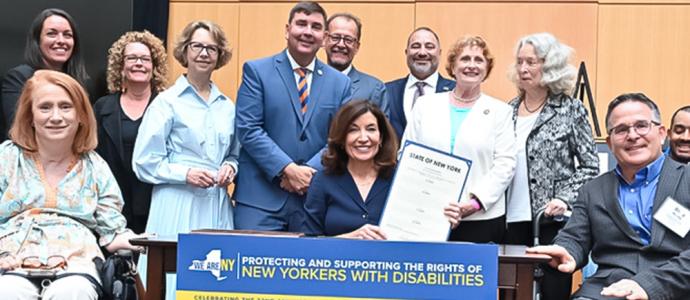On the 32nd anniversary of the Americans with Disabilities Act in July, Governor Kathy Hochul signed a law formalizing Supported Decision-Making Agreements (SDMAs) in New York State. Hochul’s actions mark a huge victory for the 100,000-plus New Yorkers with intellectual and developmental disabilities (I/DD) and help set a promising example to the rest of the country.
The new law creates a formal pathway for New Yorkers with I/DD to maintain their autonomy. Since 2014, 11 states across the country have passed similar SDMA legislation, including Texas and Wisconsin.
SDMAs are an alternative to legal guardianship that allow adults with I/DD to exercise greater autonomy. People with SDMAs have a trusted supporter who helps them make decisions, but final authority for decision-making lies with them, not the supporter. For example, with an SDMA, a decision-maker can decide where to live after consulting with their supporter(s). Under guardianship, the legal guardian tells them where they will live with no room for discussion or feedback.
SDMAs already informally existed in New York, but, as Betsy Williams, YAI’s Director of Clinical Services observed, they were often ignored, particularly in hospital settings, where doctors did not understand what freedoms SDMAs provide.
“With supported decision-making, you could go through the whole process and get the family and the person with the disability on board, but then you go to the doctor and they say, ‘I can only give mom and dad the information.’ And you say, ‘No, no, no, they’ve done the supportive decision-making process’ and the doctor still says no,” said Williams. “Staff see somebody come in that looks different, and they automatically think that they are incompetent to make a medical decision.”
Adults in New York with I/DD who participate in SDMAs reported increased happiness and confidence, less anxiety, greater ability to advocate, and a sense of maturity and control, according to the Human Services Research Institute. Additionally, because adults with SDMAs have more autonomy, they are less at-risk of financial or physical abuse because they, not a guardian, have final say over many decisions in their lives.
YAI joined the effort to pass SDMA legislation in 2022, persuading legislators that the bill’s merits aligned with the larger movement toward autonomy. After several meetings, including multiple conversations with Assemblymember Tom Abinanti, Chair of the Committee on Disabilities, a circulated letter of support, and some last-minute strategizing with the bill’s sponsor, Assemblymember Jo Anne Simon, the bill passed both houses of the New York legislature.
Expanding supported decision-making in New York has been a project more than five years in the making. In 2016, an advocacy group, Supported Decision-Making New York (SDMNY), formed to run a pilot to facilitate SDMAs in collaboration with Hunter College CUNY, the New York Alliance for Inclusion and Innovation, and a host of other partners and advisors that included judges, self-advocates, and more.
SDMNY set out to demonstrate how supported decision-making can work even for those with severe intellectual disabilities. After four years of success, SDMNY moved to codify the principles of SDM and began advocating to turn them into law.
Former judge Kristin Booth Glen, now a professor at the CUNY School of Law, is one of the advisors to SDMNY and explained her support of the legislation.
“I was the Surrogate in Manhattan from 2005-2012 where I heard guardianship petitions. I saw many people whom I thought didn’t need guardianship and shouldn’t have all their rights taken away as long as they could just get some good support.”
Advocates look forward to advising more decision-makers and their supporters in the future and to educating judges around SDMAs.
“The whole point of supported decision-making is not to focus on legal guardianship but to focus on individuals having a support group to make the best decisions for themselves so they can be heard,” said Williams. “YAI’s whole person-centered process blends beautifully with supported decision-making.”

